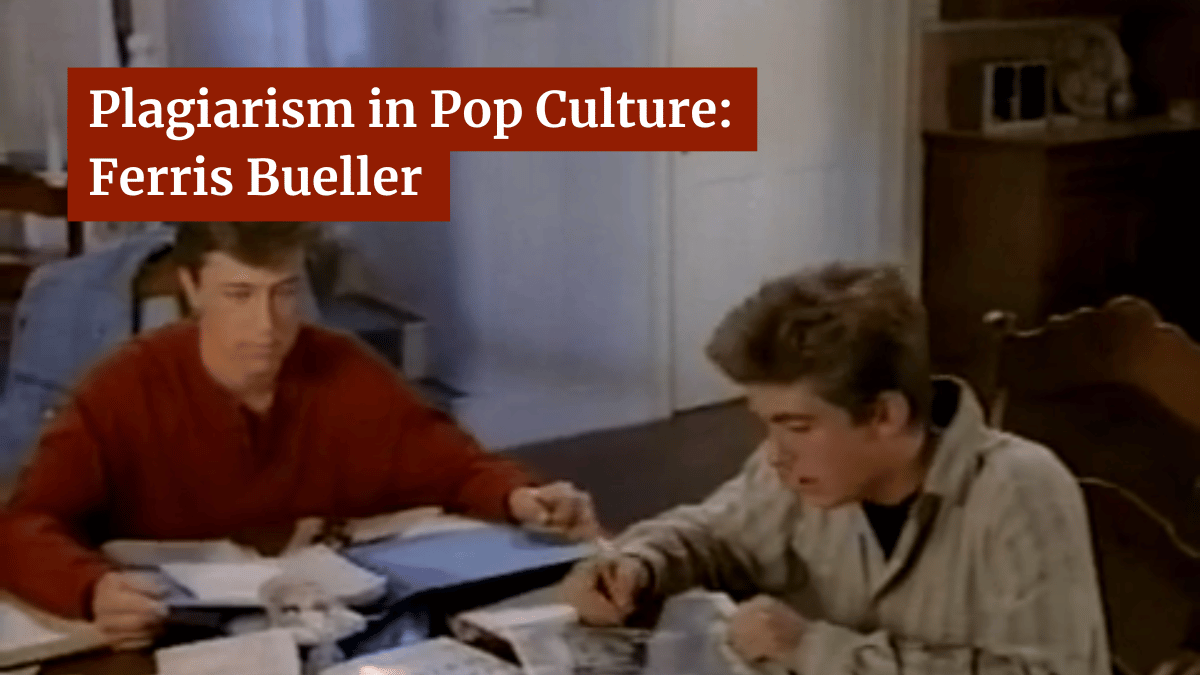Plagiarism in Pop Culture: Ferris Bueller
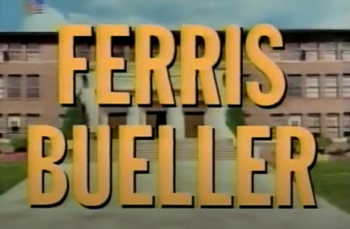
When I say the words “Ferris Bueller,” most reasonable people think of the 1986 John Hughes film Ferris Bueller’s Day Off. The film is a comedy classic and has remained famous and cherished even today.
What is much less well known is the short-lived sitcom based on the characters. Entitled Ferris Bueller, the sitcom lasted one season and a total of 13 episodes that aired 1990-1991. It has the unique distinction of being overshadowed by both its source material and the other Ferris Bueller knockoff show, Parker Lewis Can’t Lose, which lasted 73 episodes over 3 seasons.
Part of the reason the Ferris Bueller show flopped was likely due to the fact none of the film’s cast returned and neither did John Hughes. However, the show did feature a pre-Friends Jennifer Anniston, who played Ferris’ younger sister, Jeanie. Unfortunately, it was not enough to save the show from early cancellation and obscurity.
On the show’s final episode, entitled A Night in the Life, the duo of Ferris and Cameron are forced to make up a paper due to Cameron’s plagiarism, sending the two on a wild adventure that keeps them out all night.
But how realistic was the plagiarism and what lessons did it teach its viewers? To understand that we will start with the episode itself.
Content Warning: Spoilers for Season 1, Episode 13 of Ferris Bueller (the TV Show).
The Plot
The episode begins in typical fashion with Ferris explaining to the audience what is going on. He explains that he and Cameron have split up their projects, with Cameron working on their civics paper, which is about great Americans, while Ferris takes on an unnamed other project.
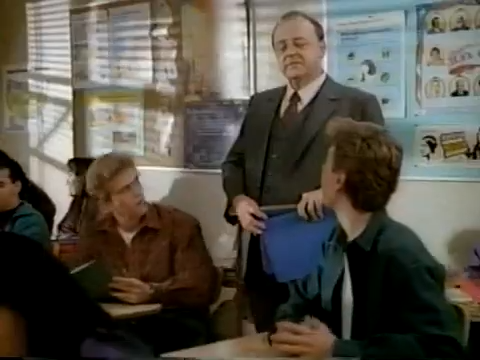
We then learn that Jeanie is dating a sophomore in college, which has made her popular at school but also earned her a grounding from her parents for staying out too late. We then cut to Ferris and Cameron getting their paper back, with their teacher, Mr. Carter, saying, “Never have I seen such rampant, unadulterated plagiarism.”
Cameron, clearly not understanding, says, “Well, we worked very hard sir.”
Upset, Ferris asks Cameron if he copied the paper from somewhere. Cameron said, “Yeah, the biography of Lyndon B. Johnson” and that he did it because, “It’s on the best seller list, it’s not like I copied from some encyclopedia.”
The teacher, saying that Ferris’ work is usually “exemplary” gives the pair another chance, with instructions to hand in their paper by 9 AM tomorrow. The two then agree to meet at Ferris’ place to work on the paper.
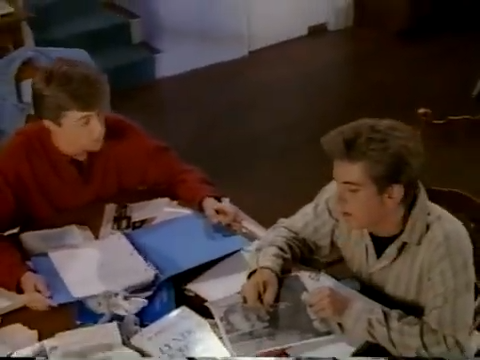
The next time we see the pair, they are actively working on the paper. However, after three hours of work they have only designed the cover and written the first sentence of the paper. Ferris decides that they need a break, and they head out to a pizza place across town.
There, they bump into a former classmate named Mike, who had dropped out of school to start a job. Mike asks them for a ride to Union Station so he can walk his grandfather home. The two agree even though it is 20 minutes in the wrong direction, and they are already under a time crunch.
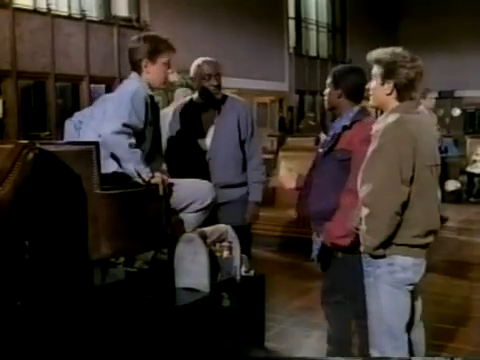
At the station, they meet Mike’s grandfather and learn Mike never told him that he dropped out of school. Ferris and Cameron leave to go home but find that their car is gone. Panicked, they begin roaming the neighborhood and run into a group of gangsters, who force them into a car.
While this is going on, Jeanie has crept out of the house to attend a frat party with her boyfriend. However, after the date goes awry, she storms out to learn that her car has been taken too.
The gangsters inform Ferris and Cameron that their car was towed by the police and drive them to the impound lot. There, they run into Jeanie who apparently learned the same thing. However, the lot is closed, and it does not open for several hours.
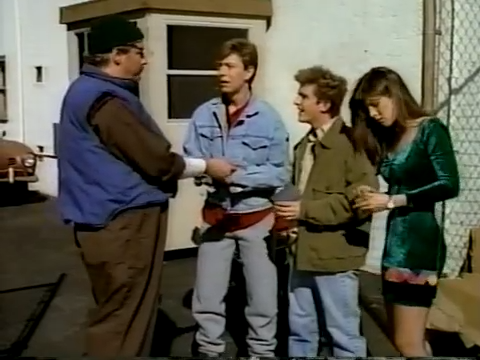
When the lot does open, it is already daylight and the three of them only have enough money to get one car out. Jeanie agrees to abandon her selfish ways for a moment and gets Cameron’s car out and they head to school.
There, sleep deprived and paperless, the duo opt to give an oral report. Though they initially try to stammer through a presentation about LBJ, they end up taking the assignment of “Great Americans” in a different direction and talk about the people they met the night before, including the restaurant owner, Mike’s grandfather, and the helpful gang members.
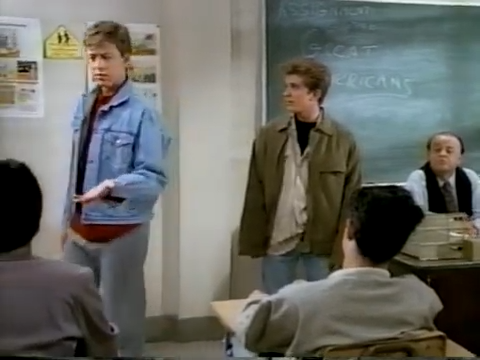
The class erupts in cheers, but the teacher is less impressed, giving them a C-. They then bump into Mike, who agrees to re-enroll in school.
The show ends with Jeanie returning home, facing even stiffer punishment after being caught sneaking out again. However, Ferris takes the blame for her and, though grounded, is happy he finally gets to go to sleep.
Understanding the Plagiarism
The plagiarism in the story is relatively simple. Cameron copied their paper from a book and submitted it as his own. It is about as basic and clear as plagiarism gets.
But despite it being a brief exchange and about as comically basic as it can be, it is still incredibly interesting. The reason is that Cameron does not realize he did anything wrong. In fact, he was confident he was in the right because he did not copy from an encyclopedia.
As someone who was in school during this period, this makes a lot of sense. Encyclopedias were the boogey men of poor sourcing, much like Wikipedia is today. Using an encyclopedia as a reference was seen as lazy work and even citing one was seen as poor research.
That said, the plagiarism strikes me as a bit unrealistic. Cameron knew enough to not use an encyclopedia and to find a legitimate biography, but not enough to not simply copy it. Furthermore, it seems like this plagiarism would not have saved a great deal of time, since he could not copy and paste from the source, he had to retype the book by hand and, most likely, alter the content to fit the format.
By the time he was done with that, it would not have been much additional work to just draft an original paper and cite the sources well.
Likewise, it is also never explained how the teacher easily detected the plagiarism. Most likely it was because the writing style or quality was out of character (unless Cameron just photocopied the pages), but it is unlikely that the teacher was so familiar with the book that he recognized it, and plagiarism detection software did not exist in 1990/91.
Also, the teacher’s response feels out of place. Though redoing an assignment is a common response to minor plagiarism issues, this is not a minor one. The whole assignment was copied. A stronger response than simply trying again the next morning seems appropriate, but plagiarism also was not the hot issue in the early 90s, mostly since it was not as common.
In the end, the message of the episode, when it comes to plagiarism, is that it is not a big deal. If you commit flagrant plagiarism, you can just redo the assignment the next day and, when you fail to do that, you can just pivot to an oral assignment and at least get a passing grade. That, clearly, is not an accurate or good message.
However, one thing the episode does get right is the issue of students struggling with time management, group assignments and writing papers broadly. Cameron and Ferris constantly struggle to write what should be a simple paper and they are repeatedly sidetracked while trying to work on it.
Though much of the sidetracking is their fault, it is illustrative of why many bright students do turn to plagiarism. Struggles with time management, having groupmates you do not work well with (even if you are good friends otherwise) and just struggling with writing are all real issues students face.
Obviously, there are better ways to deal with these issues than running off for pizza mid-project or plagiarizing a biography. However, it is an issue that is just as relevant today as it was in 1990/1.
That, in turn, keeps it from being a complete wash, like the Boy Meets World episode or the film Back to School, both of which were from around the same time.
Bottom Line
Complaining about how the plagiarism in Ferris Bueller is not realistic is a classic example of spitting in the wind. Ferris Bueller, Boy Meets World, Back to School and so forth are all examples of school-based comedies from that era that are meant to be surrealist parodies of actual school life.
To that end you could include Saved by the Bell, The Breakfast Club and Heathers in that group as well. None of these shows or films were meant to accurately represent school life, be it high school or college. Much of the humor from these works is based on how unlike actual school they are.
That is also not a tradition that is exclusive to that era as Grease and Mean Girls are hardly documentaries either.
Still, popular culture does play a critical role in shaping how others think about various issues and plagiarism is no different in that regard. While mentions like this one increased awareness about plagiarism, they also carried the message that it was not a big deal and that, while it was wrong, you would not get in serious trouble. Certainly, nothing you could not get out of.
That said, even with that context, I have trouble taking this too seriously. In the days before the internet, plagiarism was a very different beast. It was much less common, especially when you look at this kind of plagiarism and at this level, so it was likely seen as a safer issue to joke about.
At least with this show the plagiarism did have some consequences and it could be argued that Ferris and Cameron’s whole ordeal could have been avoided if either they had not plagiarized or simply stayed on task when working on the make good.
Then again, there would not have been much of a show if they had. It is another example of bad decisions at least leading to sitcom stories.
More Plagiarism in Pop Culture (In Reverse Order)
Want more Plagiarism in Pop Culture? There Are 40 others to check out!
- Ferris Bueller
- Randy Feltface
- Bob’s Burgers
- Columbo (Part 2)
- Columbo (Part 1)
- Death in Paradise (Part 2)
- American Auto
- Saturday Night Live
- The Conners
- Death in Paradise (Part 1)
- Lobachevsky
- Back to School
- The Golden Girls
- Young Sheldon
- The Goldbergs (Part 2)
- King of the Hill (Part 2)
- Yesterday
- King of the Hill (Part 1)
- The Kids Are Alright
- Big Fat Liar
- Coco
- Re-Animator
- Elementary
- Instinct
- Fresh Off the Boat
- The Goldbergs (Part 1)
- Lou Grant
- Star Trek: The Original Series
- Arthur
- Criminal Minds
- Mystery Science Theater 3000
- Cheers
- WKRP in Cincinnati
- Boy Meets World
- Law & Order: Criminal Intent (Part 2)
- Law & Order: Criminal Intent (Part 1)
- Jane the Virgin
- The Waltons
- Leave it to Beaver
- The Facts of Life
Want to Reuse or Republish this Content?
If you want to feature this article in your site, classroom or elsewhere, just let us know! We usually grant permission within 24 hours.
